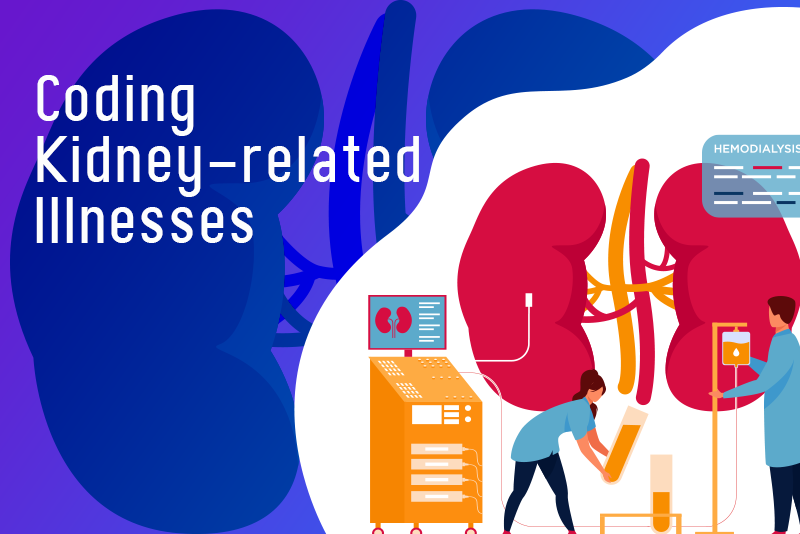Kidney-related illnesses can interfere with the body’s capacity to clean the blood, filter extra water out of blood, and regulate blood pressure. Any injury to your kidneys can lead to a build-up of waste and fluid, which can cause edema, nausea, weakness, restless nights, and breathing difficulties. Those with diabetes or high blood pressure are at greater risk for kidney disease. For accurate diagnosis of kidney diseases, nephrologists perform a detailed physical exam, check for signs of problems with the heart or blood vessels, and conduct various tests and procedures. The diagnosis procedures can be reported on the medical claims using accurate ICD-10 codes.
For proper code assignment, it is important for coding professionals at medical coding companies to understand what exactly the condition is, underlying causes, risk factors, as well as treatment options.
ICD-10 Codes for Kidney-related Illnesses
Fabry disease
This is a rare but serious genetic disease that causes life-threatening heart and kidney problems. It affects all body organs, including your heart, brain and kidneys.
- E75.2 Other sphingolipidosis
- E75.21 Fabry (-Anderson) disease
Cystinosis
This condition is caused by accumulation of the amino acid cystine within cells. Distinct types of cystinosis are nephropathic cystinosis, intermediate cystinosis, and non-nephropathic or ocular cystinosis.
- E72.04 Cystinosis
Glomerulonephritis
This condition refers to the damage to the tiny filters inside the kidneys (the glomeruli). The condition can be diagnosed with blood or urine tests.
- N04 Nephrotic syndrome
- N04.0 Nephrotic syndrome with minor glomerular abnormality
- N04.1 Nephrotic syndrome with focal and segmental glomerular lesions
- N04.2 Nephrotic syndrome with diffuse membranous glomerulonephritis
- N04.3 Nephrotic syndrome with diffuse mesangial proliferative glomerulonephritis
- N04.4 Nephrotic syndrome with diffuse endocapillary proliferative glomerulonephritis
- N04.5 Nephrotic syndrome with diffuse mesangiocapillary glomerulonephritis
- N04.6 Nephrotic syndrome with dense deposit disease
- N04.7 Nephrotic syndrome with diffuse crescentic glomerulonephritis
- N04.8 Nephrotic syndrome with other morphologic changes
- N04.9 Nephrotic syndrome with unspecified morphologic changes
- N04.A Nephrotic syndrome with C3 glomerulonephritis
Lupus nephritis
Systemic lupus erythematosus (SLE) is the form of lupus that can harm your skin, joints, kidneys and brain and may be fatal. When this lupus type affects the kidneys, it is called lupus nephritis.
- M32 Systemic lupus erythematosus (SLE)
- M32.0 Drug-induced systemic lupus erythematosus
- M32.1 Systemic lupus erythematosus with organ or system involvement
- M32.10 Systemic lupus erythematosus, organ or system involvement unspecified
- M32.11 Endocarditis in systemic lupus erythematosus
- M32.12 Pericarditis in systemic lupus erythematosus
- M32.13 Lung involvement in systemic lupus erythematosus
- M32.14 Glomerular disease in systemic lupus erythematosus
- M32.15 Tubulo-interstitial nephropathy in systemic lupus erythematosus
- M32.19 Other organ or system involvement in systemic lupus erythematosus
- M32.8 Other forms of systemic lupus erythematosus
- M32.9 Systemic lupus erythematosus, unspecified
aHUS
This rare genetic condition can cause tiny blood clots to form in the body’s small blood vessels, which can block blood flow to organs like kidneys.
- D59.3 Hemolytic-uremic syndrome
- D59.30 …… unspecified
- D59.31 Infection-associated hemolytic-uremic syndrome
- D59.32 Hereditary hemolytic-uremic syndrome
- D59.39 Other hemolytic-uremic syndrome
Polycystic kidney disease
This genetic disorder that causes cysts (growths filled with fluid) to form in your kidneys and other organs. These cysts lower your kidney’s ability to filter fluid and waste from your blood. Over time, PKD can cause kidney failure.
- Q61.1 Polycystic kidney, infantile type
- Q61.11 Cystic dilatation of collecting ducts
- Q61.19 Other polycystic kidney, infantile type
- Q61.2 Polycystic kidney, adult type
- Q61.3 Polycystic kidney, unspecified
Acute kidney failure
Also called acute renal failure or acute kidney injury, acute kidney failure occurs when the kidneys suddenly fail to filter waste products from the blood.
- N17 Acute kidney failure
- N17.0 Acute kidney failure with tubular necrosis
- N17.1 Acute kidney failure with acute cortical necrosis
- N17.2 Acute kidney failure with medullary necrosis
- N17.8 Other acute kidney failure
- N17.9 Acute kidney failure, unspecified
Chronic kidney disease (CKD)
Chronic kidney disease or chronic kidney failure can cause a gradual loss of kidney function. It is mainly caused due to diabetes, high blood pressure, heart disease, or a family history of kidney failure.
- N18 Chronic kidney disease (CKD)
- N18.1 Chronic kidney disease, stage 1
- N18.2 Chronic kidney disease, stage 2 (mild)
- N18.3 Chronic kidney disease, stage 3 (moderate)
- N18.30 Chronic kidney disease, stage 3 unspecified
- N18.31 Chronic kidney disease, stage 3a
- N18.32 Chronic kidney disease, stage 3b
- N18.4 Chronic kidney disease, stage 4 (severe)
- N18.5 Chronic kidney disease, stage 5
- N18.6 End stage renal disease
- N18.9 Chronic kidney disease, unspecified
Alkaptonuria
This rare genetic metabolic disorder is characterized by the accumulation of homogentisic acid in the body. This condition can lead to heart problems, kidney stones, and prostate stones.
- E70.29 Other disorders of tyrosine metabolism
Alport syndrome
This is a genetic form of kidney inflammation (nephritis) that damages the tiny blood vessels in the kidneys. Three genetic types of Alport Syndrome are – X-linked Alport syndrome (XLAS), Autosomal recessive Alport syndrome (ARAS), and Autosomal dominant Alport syndrome (ADAS).
- Q87.81 Alport syndrome
Autosomal dominant hypocalcemia
This condition is caused by low levels of calcium in the blood. Key symptoms include muscle spasms in the hands and feet, muscle cramping, prickling or tingling sensations, or twitching of the nerves and muscles in various parts of the body.
- E83.51 Hypocalcemia
Bartter syndrome
This group of similar kidney disorders can cause an imbalance of potassium, sodium, chloride, and related molecules in the body. Common symptoms include muscle weakness, cramping, spasms and fatigue.
- E26.81 Bartter’s syndrome
Nephrologists, primary care doctors and specialists treating kidney diseases can rely on professional medical billing companies to submit clean claims and get reimbursed on time. Make sure that the billing and coding specialists are up-to-date with the changing coding standards and they report the right codes on the claims, which prevents claim denials and delays.




